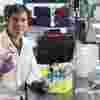We are working with patient advocacy group Let’s Cure ACC to advance vital research into adrenocortical cancer (ACC) - a rare and aggressive cancer that affects around one person per million each year. With it being so uncommon, adrenocortical cancer is often difficult to detect, diagnose, and treat, leaving patients with very few treatment options.
Research is all about worldwide collaborations, this is particularly true for rare tumours such as adrenal cancer. All progress in this field has come from concerted international effort from clinicians and basic scientists. Without the generosity of Curestarters, bold research ideas like this would not be funded. Their support makes a big difference to start innovative projects that may change the lives of cancer patients in the future.

A partnership to accelerate adrenocortical cancer research (ACC)
Earlier this year, the world was reminded of the devastating impact of ACC, when award-winning Belgian actress Emilie Dequenne tragically passed away following a relapse, aged just 43. Her passing further highlighted the urgent need for more research and awareness of this rare form of adrenal cancer.
Let's Cure ACC is dedicated to raising awareness and supporting those with adrenal cancer by connecting patients, researchers, and medical professionals.
Partnering with Fondation ARC in France, Worldwide Cancer Research is co-funding promising research with early evidence that testosterone could help slow the growth of this cancer. Dr Pierre Val and his team believe this work could lead to a new, and much needed treatment for patients with adrenocortical cancer.

Exploring the role of testosterone in slowing adrenal cancer growth
The researchers have discovered that testosterone could help our immune system to recognise and attack adrenocortical tumours. The hormone appears to assist a type of white blood cell, called a macrophage, to engulf and ‘eat’ the cancer cells, slowing the speed of cancer growth.
As testosterone is a hormone that our bodies already naturally produce in different quantities, it may not be a suitable treatment for everyone. Dr Val will also investigate the exact molecular processes that make testosterone such a potentially effective treatment. This will help to identify possible new mechanisms that brand new cancer drugs could target, that should be suitable for more people.
Research into rare cancers can be difficult, which makes this work even more important. Ultimately, Dr Val’s work will help to identify possible new cures that could one day improve the lives of patients with adrenocortical cancer.
Giving hope to patients thanks to a united effort
After nearly two years of misdiagnosis, a high testosterone test in 2018 revealed that Catherine Heitz-Lamy had adrenal tumors on both of her kidneys, and she was diagnosed with adrenocortical carcinoma (ACC).
Following surgeries and four years of adjuvant chemotherapy, she was declared cancer-free in 2023.
Driven by her experience, Catherine co-founded Let’s Cure ACC to support patients and connect with medical experts worldwide. Now a full-time volunteer, she uses her luxury fashion marketing background to advocate for ACC patients.
Catherine lives with her supportive husband and has three adult sons, balancing family life with her mission to improve outcomes for others.

Valérie was diagnosed with adrenocortical carcinoma in September 2020, aged 52.
As an oncology representative, she was concerned when she began to suffer severe night sweats, pushing for a CT scan after initial tests revealed high blood pressure and abnormalities in her blood.
Doctors discovered a mass measuring more than 10cm on her right adrenal gland - on top of her right kidney. She underwent surgery to remove the tumour where surgeons also removed her right adrenal gland and 15 lymph nodes.
Her life was turned upside down when doctors finally phoned her to tell her that she had been diagnosed with cancer. Despite working in oncology, she had never heard of ACC and when she searched online, she learned it was a cancer that had a poor prognosis.
Valérie had to adapt to a tough treatment plan which involved taking chemotherapy drug Mitotane every day for five years until October 2025, when she reached the major milestone of being able to stop chemotherapy treatment.
Every day, I woke up afraid of dying. I lost my carefree spirit and had to adapt and live with that fear. I felt very alone for years, though less so thanks to the support of other adrenocortical carcinoma patients I could talk with.
Marc was diagnosed with adrenocortical carcinoma in 2017 at the age of 45.
Despite the aggressive nature of the disease and uncertainty about operability, Marc underwent a seven-hour surgery to remove the tumour they had discovered completely, followed by chemotherapy treatment.
Over the next few years, Marc faced several setbacks, including liver metastases that required additional surgeries and chemotherapy. The long course of treatment caused significant side effects such as fatigue, cognitive challenges and multiple Addisonian crises - a life-threatening medical emergency caused by a severe lack of cortisol.
Throughout this difficult journey, Marc’s wife was a constant source of support and, despite grim predictions, he was declared tumour-free in early 2020.
Marc now lives as an ACC survivor, adapting to the lasting impact of treatment while finding purpose in helping others through his role on the board of Let’s Cure ACC. His story highlights the importance of expert care, emotional support, and the strength found in perseverance, showing that even with a rare and aggressive cancer, a fulfilling life beyond diagnosis is possible.

Thanks to new research, side effects like Marc's could become a thing of the past.
With the use of testosterone to treat ACC, it could lead to fewer side effects, than current treatment options such as chemotherapy. This could not only save lives but allow patients more time with their loved ones and a better quality of life.
Cancer is not just one disease, but many affecting an ever-increasing number of people across the world. No single research funder, company or even country can tackle this problem on their own. This is particularly true of the many rare cancers, like ACC, where there has been very little research and fewer treatments.
Partnerships like these can make real progress into starting a cure for such a rare disease.
Thanks to our many generous Curestarters around the world, we can help start new cures, so that one day no life is cut short by cancer. That’s why we are proud to partner with Fondation ARC to support this vital research and hope it will make a real difference to everyone affected.

While this news is incredibly exciting and offers hope that we could be getting closer to a new way to prevent and treat adrenocortial carcinoma (ACC), the research is still at a very early stage.
Under no circumstances would we advise anyone - patient or otherwise - to use testosterone or related compounds without first seeking medical advice.
Testosterone products sold online are not medically regulated, and unprescribed testosterone use can result in serious side effects like increased cardiovascular risk, heightened prostate cancer risk, and behavioural changes. Further investigations (including those supported by Worldwide Cancer Research) and clinical trials will be essential before these findings can be translated into anything that can be used in patient care.

Join our united effort to stop cancer.
There are so many different ways to support our search for new cures. Will you join the 90,000+ Curestarters who are already helping us get closer to a day when no life is cut short by cancer?




